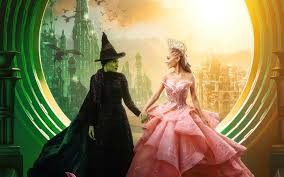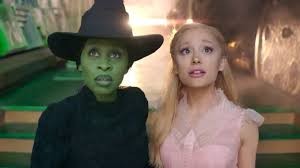Inspired by Gregory Maguire's book "Wicked: The Life and Times of the Wicked Witch of the West," the stage version of Wicked has turned into a phenomenon since it first premiered on Broadway in 2003. The musical, with music and lyrics by Stephen Schwartz, and a book by Winnie Holzman, offers a fresh perspective on the beloved characters from L. Frank Baum's "The Wonderful Wizard of Oz." Delving into themes of friendship, identity, and moral ambiguity, Wicked invites audiences to reconsider the classic tale through the eyes of two witches who couldn’t be more different.
The Central Characters: Elphaba and Glinda
At the heart of Wicked are its two protagonists, Elphaba and Glinda, portrayed with complexity and depth. Elphaba, later known as the Wicked Witch of the West, is distinguished by her emerald complexion and a deep commitment to justice, frequently opposing the various wrongs within the land of Oz. She is portrayed as an intelligent, passionate, and misunderstood character whose life choices lead her down a path of isolation and tragedy.
In contrast, Glinda is vibrant, popular, and initially shallow. Her journey reveals layers of depth and a growing awareness that challenges her superficiality. The dynamic relationship between Elphaba and Glinda serves as the backbone of the narrative, evolving from rivalry to a deep and nuanced friendship that seeks to push against the societal norms of Oz.
The Narrative Structure of Wicked
Wicked offers a distinct narrative as it serves as a prequel to the Wizard of Oz, delving into the backstories of Elphaba and Glinda prior to their transformation into the legendary characters within Baum's tale. The nonlinear approach to storytelling allows the audience to uncover the events that shape the characters’ destinies, highlighting the complexities of good and evil.
The plot revolves around Elphaba’s journey as she grapples with her green skin, her magical abilities, and her desire for acceptance. Her friendship with Glinda, juxtaposed with their differing ideologies, forms the crux of the story. Themes such as discrimination, the quest for power, and the consequences of one’s choices are woven intricately throughout the musical.
Musical Composition and Highlights
One of the standout features of Wicked is its exceptional score. Stephen Schwartz’s compositions—including powerful ballads and upbeat numbers—have become staples in musical theater. The show opens with "No One Mourns the Wicked," a bold commentary on societal norms, followed by the iconic "Defying Gravity," which marks a pivotal moment of self-acceptance and empowerment for Elphaba.
Other notable songs include "Popular," showcasing Glinda’s comedic flair and charm, and "For Good," a poignant duet that encapsulates the essence of friendship and the impact individuals have on each other’s lives. These songs are not only memorable but also crucial in advancing the narrative and developing character arcs.
The Visual Spectacle of Wicked
The design of the sets and scenery in Wicked greatly enhances the overall experience of the musical. The set design, by Eugene Lee, creates a fantastical world of Oz that contrasts the dark, moody elements associated with Elphaba’s journey and the more whimsical aspects tied to Glinda's. The costumes, designed by Susan Hilferty, vividly depict the personality differences between the two leads—with Elphaba’s dark, elegant attire contrasting sharply with Glinda’s bright, bubbly ensembles.
The visual storytelling is complemented by Martin Pakledinaz's choreography, which seamlessly integrates movements that reflect the characters' emotions and relationships, making for a mesmerizing theatrical experience.
The Themes of Friendship and Loyalty
Friendship emerges as a central theme in Wicked. The bond between Elphaba and Glinda illustrates how loyalty can be tested by differing beliefs and societal pressures. Their relationship evolves as they navigate political conflicts, personal ambitions, and external adversities, providing insight into the nature of true friendship.
The musical explores how loyalty can sometimes lead to difficult choices. As Glinda becomes more enmeshed in the politics of Oz, her decisions reflect her struggle between staying true to Elphaba and achieving her own social aspirations.
Political Commentary in Wicked
Wicked does not shy away from addressing intricate political themes. The narrative mirrors real-life issues of power, propaganda, and the moral ambiguity of leadership. The character of the Wizard represents corrupted authority, using fear and misinformation to control the citizens of Oz.
Elphaba’s quest to expose the injustices and fight against the Wizard's regime resonates with contemporary audiences, drawing parallels to issues of social justice, equality, and the fight against oppression. Wicked encourages viewers to question the narratives imposed by those in power and to seek the truth behind the facade.
Impact on Broadway and Global Stages
Since its premiere, Wicked has made a significant impact on Broadway and around the world. The musical has become a cultural phenomenon, garnering numerous awards, including three Tony Awards and a Grammy Award for Best Musical Show Album. Its popularity has sparked international productions, with performances staged across various cities, from London to Australia.
The enduring appeal of Wicked can be attributed to its relatable themes, outstanding music, and the compelling portrayal of its characters. Audiences are drawn not only to the spectacle but also to the profound messages that resonate across generations.
Fan Community and Cultural Reception
The Wicked fan community is vibrant and passionate. Fans often partake in discussions about character interpretations, themes, and the musical's various productions. The community continues to grow, with social media platforms providing a space for sharing fan art, attending conventions, and participating in discussions about the deeper meanings of the narrative.
Moreover, Wicked has influenced popular culture significantly, inspiring countless parodies, merchandise, and references in various media forms, further solidifying its place in theatrical history.
Wicked’s Artistic Collaborators
The collaboration between Stephen Schwartz and Winnie Holzman has been pivotal to the musical's success. Schwartz’s ability to create memorable melodies and insightful lyrics combined with Holzman’s adept storytelling creates a rich tapestry of narrative and sound. These two artists have poured their creativity into the project, leading to a unified artistic vision that has captivated audiences worldwide.
The Evolution of Elphaba: A Journey of Self-Discovery
Elphaba’s evolution throughout Wicked represents a journey of self-discovery, grappling with her identity in a world that often judges based on appearances. As she embraces her powers, she confronts societal norms, particularly regarding beauty and acceptance. The internal conflict she experiences highlights the struggle many individuals face in a world that often prioritizes conformity over authenticity.
Her ultimate acceptance of her identity leads her to empower others to embrace their differences, making a statement about self-love and acceptance that resonates with audiences of all ages.
Glinda’s Transformation: Growth and Understanding
Glinda's character arc is equally compelling as she transitions from a superficial girl to a more empathetic and understanding individual. Her willingness to grow and confront her own privileges and biases demonstrates the potential for change within everyone. Through her experiences, she learns to question societal standards and ultimately recognizes the value of selfless friendship.
Glinda’s transformation provides a stark contrast to Elphaba’s journey, showcasing the multifaceted nature of growth and the power of understanding in overcoming differences.
Adaptations and Upcoming Film Version
The success of Wicked has resulted in its transformation into a much-awaited movie, aimed at reaching a wider audience with the narrative. With intense speculation surrounding casting choices and production details, fans eagerly await the film’s release, hoping it can capture the magic of the stage production.
By utilizing contemporary filmmaking methods, the film seeks to present a new viewpoint on the cherished narrative while staying true to the fundamental themes of the musical. Anticipation abounds, fueling discussions about how the narrative will translate onto the big screen.
Lessons of Empathy and Understanding
At its core, Wicked teaches vital lessons of empathy and understanding. By exploring the lives of characters traditionally portrayed as villains, the narrative encourages audiences to consider multiple perspectives and the complexities of individual motives. This understanding can foster compassion in a society often quick to judge others.
Wicked challenges viewers to look beyond surface appearances and question the true nature of good and evil, emphasizing the importance of empathy in our daily interactions.
The Legacy of Wicked in Musical Theatre
Wicked's success has left an indelible mark on the landscape of musical theater. It has influenced the genre by proving that shows can tackle profound social issues while remaining entertaining. The musical's blend of humor, heart, and powerful storytelling has inspired a new generation of musicals that seek to explore complex themes.
In addition, Wicked has elevated its leading performers, allowing them to become cultural icons and paving the way for future stars in the theater world. The production's legacy will continue to inspire new works and artistic endeavors in the realm of musical theater.
Casting and Performance Dynamics
The casting choices in Wicked have consistently drawn acclaim, with numerous actors bringing their unique interpretations to the roles of Elphaba and Glinda. Each performer has added their flair, contributing to the musical’s evolving legacy and influencing how the characters are perceived. The chemistry between leads is paramount, and audiences are often captivated by the nuances that different pairings bring to the stage.
Performers who take on these roles frequently comment on the emotional demands of the characters, particularly Elphaba, whose journey encompasses a range of challenging emotions. This level of commitment to character portrayal enhances the authenticity of the storytelling.
Conclusion: The Enduring Power of Wicked
Wicked's power lies in its ability to resonate with diverse audiences, tapping into universal themes of love, friendship, acceptance, and the quest for identity. The musical’s journey through the lives of Elphaba and Glinda offers reflections on how individuals navigate societal challenges, showcasing the timeless struggle for self-acceptance amidst external expectations. With its rich narrative, memorable music, and endless appeal, Wicked will undoubtedly continue to enchant and inspire audiences for years to come.
Screenshots



-
Rating:
5




